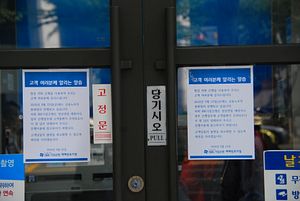A vocal week of labor union strikes in South Korea against the government’s performance-based wage mandate has fizzled out on lower-than-expected participation, leaving little in the way of the country’s major banks kicking off a new salary system that is said to put junior-level employees at risk.
Following a general strike on Thursday by the labor union for public enterprises, Korea’s financial workers’ union convened in a soccer stadium at the edge of the capital, Seoul, on Friday. They argued that the new government-mandated Western-style wage system, which requires pay raises to be based on performance instead of tenure, will put junior-level workers more at risk for dismissal as they are in less control over their team’s success than their seniors.
The government has mandated the company-friendly labor reform to save a slowing economy by turning toward more globally popular methods that increase labor flexibility, kicking off in the already tightly regulated financial industry before imposing the law on freer areas. But given the stagnating conditions of the banking industry burdened by lagging productivity and shrinking margins, even the union was split on whether the walkout would pay off.
While the union had threatened a sit-out of 100,000 workers, lackluster participation brought just 15 percent of the membership to the soccer stadium. Windows at several banks across the capital held posters warning customers of the strike, but most operations were reported as normal. Nor was the strike enough to shake investor confidence, as the share prices of many major banks ended higher on the local bourse.
Despite the sour turnout, the protest signaled the labor market’s continued dissent against the government’s labor reform policies, which also introduce a wage peak system to decrease salaries after a certain age. President Park Geun-hye’s conservative-led government is still struggling to address prolonged youth unemployment, currently above 9 percent, by boosting job creation.
Systemic problems in the local labor market are a hangover of the Asian financial crisis of the late 1990s, after which the number of irregular part-time jobs skyrocketed in comparison to stable regular employment. The unstable job market has aggravated the wage gap, as 23 percent of wage workers earn less than two-thirds of the median wage, the second-worst rate in the OECD, notes Korean banking industry expert and political economist Myung-koo Kang of Baruch College in New York.
“In short, the labor market has been rapidly restructured to make laying off easier, but it doesn’t seem to have worked positively to enhance the competitiveness of the corporate sector,” he says. “But of course, from a perspective of firm owners or investors, making laying off easier may be a useful tool for cost reduction.”
It’s debatable how much of an impact the reform would have on the overall labor market or in boosting the faltering banking industry. The banking industry still only makes up about 4 percent of Korea’s GDP, owing largely to worsening performance of corporate loans as conglomerates’ profits falter, Kang says.
“I don’t think the low productivity or competitiveness of the Korean banking industry comes from labor restrictions. Instead, it’s a systemic and structural problem of the Korean economy,” he tells The Diplomat.
The system is already in place at some major banks. When British bank Standard Chartered’s local arm introduced performance-based wages in 2011, it dealt with a two-month strike but won out in the end.
Critics argue that the government could impose a more gradual transition to the new wage system or strengthen social security. But the union may have fought in vain as it appears inevitable for Korea to face the growing pains of transition.
Woojin Kim of the Korea Institute of Finance points out that the system is already in place in most of the world, and argues that the nominal differences between the raise systems will actually be minimal between underperforming and performing employees.
“Korean banks’ performance culture is not up to international standards right now,” he tells The Diplomat. “Of course, Korea does not have enough of a safety net compared to Western countries, so in some cases I … partly support the idea of the labor union.” But the parties must be able to compromise — and there is little room for the union to gain in the waning industry.
“At the end of the day, if this [reform] is not going on, the banks might be in big trouble.”

































